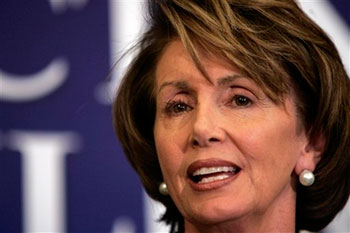Aides and advisers to congressional Democrats are pessimistic about their efforts to tie the approval of supplemental Iraq war spending to U.S. troop withdrawals. Even more challenging, they warn, would be a movement to cut off war funds entirely, which could split apart the caucus.
 According to sources involved in Democratic Iraq strategy, the party's leadership is likely to pursue smaller victories - such as stricter benchmarks, a shift in troop focus, and greater war-contracting oversight - while simultaneously putting the Republicans on record as not supporting an end to the war. The $196 billion supplemental request by the Bush administration, which is slated to be considered by Congress early next year, represents the next battleground for a legislative confrontation.
According to sources involved in Democratic Iraq strategy, the party's leadership is likely to pursue smaller victories - such as stricter benchmarks, a shift in troop focus, and greater war-contracting oversight - while simultaneously putting the Republicans on record as not supporting an end to the war. The $196 billion supplemental request by the Bush administration, which is slated to be considered by Congress early next year, represents the next battleground for a legislative confrontation.
"The whole problem has always been votes," a prominent Hill staffer told the Huffington Post. "Politically the Democratic leadership would like to have a showdown where the president has to continually veto a bill that will end the war...Eventually, however, some funding will have to get passed. We are not just going to leave them out there."
According to one high-ranking Capitol Hill aide, there were at least three reasons why Democratic leaders pushed off considering the supplemental bill until next year: there was ample money to continue funding the war, there was a desire to wait out the presidential primaries, and the party leadership, at this point in time, didn't think it could push through anything with a troop withdrawal attached. The latter issue, some predict, likely cannot be solved with time.
"In general, we feel that there is a limit to what Congress can do when it comes to ending the Iraq war," Matt Bennett, vice president of Third Way, a moderate Democratic think tank told the Huffington Post. "Bush has been ridiculous in his rhetoric but at the end of the day you have to supply the money."
Indeed, privately and increasingly publicly, those who follow Iraq policy see few levers beyond another veto showdown with Bush that the Democrats can pull. Republicans, they note, were either buoyed or kept in line by last month's testimony of Gen. David Petreaus, while Democrats were more-or-less stymied in their attempts to gain new allies on forcing a troop drawdown. Without the votes and with Republican criticism of Iraq proving far more rhetorical than substantive, the consensus is emerging that the war will not end with Bush in office.
"What makes this so difficult is that there were two elections. American got the first one wrong and the second one right. But the 2006 election can't undo 2004 and George Bush is still commander in chief," Allan Rivlin, a partner with Peter D. Hart Research Associates, told the Huffington Post.
Not everyone is convinced that, going forward, Democrats should use the supplemental to focus on the low-hanging fruit (benchmarks, investigations into war-contracting, etc...). With polls showing a strong majority favors withdrawal from Iraq, war critics are imploring congressional Democrats to insist that money only be allocated for ending the war.
"The time to lay down the gauntlet is upon us," Tom Andrews, national director of Win Without War told the Huffington Post. "We must say we are going to put up the money only to get our soldiers out of Iraq.... And for members that are feeling paranoid that a vote against the funding the war will be misconstrued, we have to give these members the confidence that it will be just the opposition."
Privately, however, some Hill staffers and advisers acknowledge that the best hope the Democrats have for victory may be simply in putting the heat on vulnerable Republican members. In the mother-of-all ironies, as one appropriations expert posited, the GOP could introduce a measure to cut off funds for the war as a way of splintering a Democratic Party divided on the issue.
"If the Democrats refuse to bring it to the floor the Republicans can do it anyway," said Scott Lilly, a senior fellow at the left-leaning Center for American Progress. "By doing it, they are not trying to end the war. They are trying to destroy the political alliance that could hopefully, at some point, bring an end to the war."
